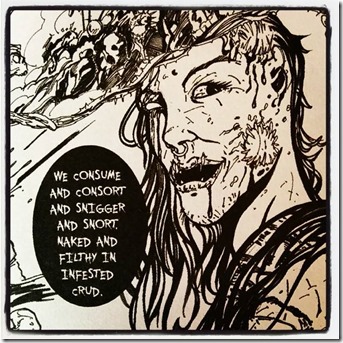I recently went to Comic Con Mumbai to launch my graphic novel The Skull Rosary. The week before it was maddening; last minute edits, waiting, back and forth and the general nervousness before anything goes to press. The one thing that struck me, and struck me hard again and again was a sense of self-censorship that we as creators – me as a writer and Vivek Goel as an artist as well as the publisher of the book – were applying to the book. We were all slightly scared, of putting out things that might offend. And in a book which was made to offend, we softened things that shouldn’t have been softened and loaded it with disclaimers. I bet we will still get some angry emails and posts and tweets. After all, self-righteousness is fashionable in the society.
Talking about transgression, or things that are taboo, that deviate from the norm is important today for us as creative people and for readers. Especially since we as a society are becoming so rigid, so unacceptable of other point of views recently. Upon just seeing The Skull Rosary’s summary, a journalist asked me if I wasn’t skeptical that this book and the way we portray Shiva and other deities will cause protests. Because protests by those who think their religion and moral stance is better than others’ is a done thing in our society and happening a little too often in our country. I answered yes, sure. Everytime some boundaries are breached, some people have a problem. You can’t help that. But as a storyteller I am willing to take the risk because stories have always been and will always be about questioning the status quo, to become a mirror to the society.
As a creative person, it’s not a choice for me to break boundaries. I write, I create because I want to break boundaries. I want to question the status quo, to force myself and the readers to look at our own filth, to touch it, gobble it, taste its grubbiness. I feel it’s my duty to transgress in everything I create, to explore the darkness inside and outside of us. For if that doesn’t happen in stories, then how will change happen? How will we progress? Move onto something new? Become (if it’s possible) better?
The Skull Rosary for me was all about exploring taboo subjects. The idea behind all five of its stories, whether its dialogue or art was to break down boundaries, both of the story and of the graphic novel as a structure. Brahma’s fifth head explores the issue of incest and is written in verse form because rhythm touches the soul in a way language can never do. So you have poetry which was inspired by the Greek Furies in comic format. The blind demon is the story of Andhaka who is blind and consumes by the desire to see. What happens when you get consumed by a desire? When it eats you up whole? So much so that you can cross any boundary to get there? Prahlad’s dream even explores what happens when a god gets drunk with desire. Then there’s the Oedipal complex, where a son desires his mother. That’s in The Other Woman. In Goat Head, a king lets his daughter die because for him a status in society is more important. These stories explore our filth, our dirty secrets and our evil sides.
Shiva to me represents everything that’s taboo in our society. He teaches us to accept everything, even those in the fringes. He’s okay with murderers, thieves, sexual deviants, prostitutes. In other words he is the guy to go to if you are on the fringes of the society. And in a society that is shrinking in acceptance, more and more people are going to the fringes, to that which is considered unnatural, taboo or unacceptable. Hello, Section 377 anyone?
On another note, the novel I am writing currently is also feeling the pressure to be self-censored. In every sentence I write, the censor board in me tries to soften the crassness, the violence, the frustration, the expletives. Sometimes I bow to it, but mostly I try and ignore the moral police inside of me. As I keep hoping that we as a society will learn to do as well.

